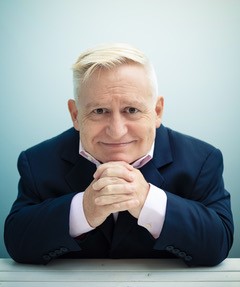In this week’s interview, Disability Smart Awards’ co-host and TV presenter Simon Minty highlights why all businesses need to value and focus on workplace disability inclusion.
Simon Minty, a long-standing ambassador of Business Disability Forum, returns on 30th April to co-host his second Disability Smart Awards. We interviewed him ahead of the event to share his views on why all businesses need to value workplace disability inclusion.
Fair Play Talks: You are presenting the Disability Smart Awards again this year. Why are the awards so important to you?
Simon Minty: I like seeing how much entering and winning the awards means to the business organisations involved. It is a pause and a pat on the back, rather than a job well done and we can all go home now moment. It is also a little moment of competitiveness. I like that because we all want to do it the best. It’s also an acknowledgement of how innovative some of the work that these organisations are doing.
In the world of workplace and customer disability inclusion, we know 90% of it, and a lot of the businesses have already done all of those things. So, it’s great when there are new things I’ve not thought about before.
Fair Play Talks: What are your highlights from last year’s awards?
Simon Minty: There are a couple of things that really stood out to me. The first was Avon and Somerset Police Service who had made their holding cells more accessible for people who are neurodivergent. The second was XRAI glass, a pair of glasses which provides live captioning for people who are deaf. These have both stayed with me as great examples of organisations trying something different.
Fair Play Talks: Your work as a disability trainer is about helping businesses to spot where they can make improvements. What are some of the biggest challenges that companies are facing around disability inclusion right now?
Simon Minty: I recently met with an organisation about some new work. They listed all of the things they are already doing. Additionally, they talked about their brilliant adjustments programme, their staff executive-sponsored ERG, and disability work internationally. They had ticked every box. So I said, “Ok, so then why do you need me?”. Their reply: “We have done all of this but we are still not getting the numbers of disabled people applying for jobs that we want. Nothing has changed.”
Although I haven’t quite got my pure answer yet, I feel that everyone knows the formula. So, one of the biggest challenges is about organisations not just having a good strategy around disability, but actually shifting the dial and getting the numbers to change.
For example, you may have the best process in the world, but are your employees actually getting the adjustments they need? Business Disability Forum recently published research that showed that employees who are seen as confident are more likely to get the adjustments they need. That’s nothing to do with process and strategy. It’s about culture and how disabled employees are made to feel about themselves by their organisation. We need to get better at measuring employee engagement if we want to understand what is really going on.
I think another challenge is how businesses respond to the generation of people coming into the workplace that don’t want to work in the traditional way. It is a real issue for organisations that I am working with. They’re saying, “We’re not getting the same level of attendance, productivity or engagement, and we have high staff turnover.”
Fair Play Talks: Does this mean that we need to fundamentally change how we work?
Simon Minty: That is part of it. But I think we also need to be a bit more honest about really thorny issues, such as the fact that sometimes work is imperfect. Sometimes, it’s not possible to have every adjustment and sometimes things just don’t fit. My clear example is of someone who had really severe anxiety and they went to work in a call centre. I would have to question whether that really was ever going to be the right job for them.
Fair Play Talks: How can businesses overcome these challenges?
Simon Minty: There are three ways that I would suggest. It’s often said but we need to stop making disability the poor relation when it comes to diversity. One of the solutions for me is to have a dedicated person who knows about disability, who is comfortable with the topic and has been given the time to commit to it. They also need to be given budgets and resources so they can really devote themselves to it.
Businesses also need to think carefully about their occupational health provision. I appreciate that the small local shop cannot provide in-house occupational health. But in larger organisations, dedicated in-house teams are often best placed to support and understand everyone’s needs. Outsourced occupational health doesn’t really support the manager or the individual in many cases.
Finally, I would say that it’s about focusing on the person, and not the disability. I co-train on a career development course for disabled people. We will often start off with 12 people who come into the room all nervous as they may have never used the word disability in relation to themselves before.
On the course, we look to model disability and ability. This means encouraging people to focus on the things that they are very skilled at rather than those things they find more difficult because of their disability. I speak to them about disability, but it is within the context of other subjects. My co-trainer may speak about imposter syndrome, for example, and I’ll bring it in there or around the experiences of a manager.
Too often, disability is confused with inability, and that’s not right. The course gives people the confidence and space to say disability is a part of me but not all of me. You can see a change in people when they leave that course. They may not have got it all figured out but they leave with a different mindset. We need to find ways that we can develop courses like this on a larger scale. That’s a challenge that I am still working on. But in short, these are just some of the reasons why businesses need to value disability more.

BIOG & AWARDS DETAILS
TV presenter and founder of disability and training consultancy Sminty Ltd, Simon Minty is a long-standing ambassador of Business Disability Forum. He recently supported their ‘Changing the image of disability’ campaign to help improve the visual representation of disabled people. He will also be co-hosting Business Disability Forum’s Disability Smart Awards with CEO Diane Lightfoot, in partnership with Bloomberg, on 30 April. Find out more and book your ticket for the virtual ceremony here.







































